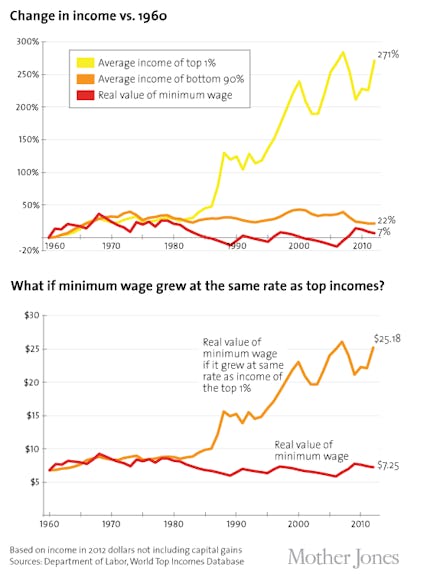Why Fast Food Workers Are Protesting Today, in 4 Charts

The news: On Thursday, fast-food workers across the country began striking en masse to demand a "living" wage of $15 an hour. While that might sound like a lot, they have a compelling point: the high-flying success of America's top earners hasn't been shared with those at the bottom of the wage spectrum.
According to Salon, the strikes are the largest such fast-food protests in history, and have been largely successful so far. University of California at Santa Barbara labor historian Nelson Lichtenstein described previous fast-food strikes as "having a big impact on public policy at the local level."
According to Kendall Fells, an organizer for Service Employees International Union (SEIU), the protests have the aim of "exposing these companies for what they are ... It'll be even bigger six months from now, and eventually the pressure will bring these organizations to the table."
How are fast-food workers treated now? As Mother Jones observed, the average fast-food worker makes just $8.94 an hour, a number that's only increased by 10 cents since 1999. Adjusted for 2012 dollars, the last time the federal minimum wage exceeded $8.94 was 1968. Since that year, the real value of the minimum wage has declined a shocking 22%.
Mother Jones put together these charts using data from the National Employment Law Project, Bureau of Labor Statistics, and the Economic Policy Institute's Family Budget Calculator.
So what's going to happen? As SEIU organize Fells explains, "[The SEIU has] done this with janitors when people thought janitors would never have a union … We did this for hospital workers and nursing home workers … So we've seen this story before, and the way that you win is you stick to the script."
Is anyone in Washington, D.C. listening? There are hints that top politicians are backing this movement. On Wednesday, President Obama warned in an economic speech that income inequality was growing at a pace which posed "a fundamental threat to the American dream."
There "is a dangerous and growing inequality and lack of upward mobility that has jeopardised middle-class America's basic bargain that if you work hard, you have a chance to get ahead," Obama said. "I believe this is the defining challenge of our time: making sure our economy works for every working American."